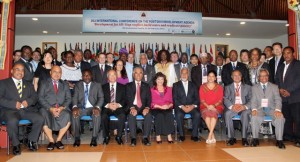“Development for All: Stop Conflicts, Build States and Eradicate Poverty!”

This is the theme of the International Conference on Post-2015 Development Agenda that started officially today 27 February at the Dili Conventions Centre with the presence of over 48 nations and 200 participants, making it the largest conference ever held in the Timorese capital city.
The organization of this event is of the responsibility of the Timorese Government in close collaboration with the United Nations Economic and Social Commission for Asia and the Pacific (UNESCAP), AusAID, the Pacific Institute of Public Policy, and the g7+.
The objective of the conference is to make available the opportunity to gather the main interested parties so as to enable them to exchange experience, promote fraternity among g7+ members, among the countries of the Pacific Islands and the development partners.
It is also the objective of the conference to harmonize ideas and build understanding, trust and consensus around actions of common interest to the post-2015 Development Agenda.
Prime Minister Kay Rala Xanana Gusmão’s speech opened the conference, followed by a video-message from the Secretary-General of the United Nations Ban Ki-moon and by the speeches of the President of the Republic of Kiribati, Anote Tong, of the Special Envoy of the President of the Republic of Indonesia, Kuntoro Mangkusubroto, as well as that of the Under Secretary-General of the United Nations and ENESCAP Executive Secretary, Noellen Heyzer.
Prime Minister Xanana Gusmão started quite obviously by making reference to the Millenium Development Goals which “having been launched in the year 2000, have helped us in the path towards development, although some countries – many of them finding themselves among the poorest countries in the world – lagged behind”.
While referring to the importance of understanding what the main obstacles were and what might be the solutions to overcome such difficulties, the Prime Minister stated that what we learnt in Timor-Leste with our own experience is that it is not possible to develop the country unless there is security and peace”.
In turn, the speakers mentioned in the respective speeches what they understand to constitute the obstacles as well as the investments for a development for all.
The President of the Republic of Kiribati spoke in particular of the financial crises, natural disasters, food security and climate changes. Kuntoro Mangkusubroto from Indonesia stressed the role of peace, security and justice, mentioned the fundamental importance of public participation as well as the need for investing in human resources, the fight against corruption and the trust between the international community and the people.
The last speaker of this opening panel was Noeleen Heyzer who, in addition to sharing the ideas of those who had taken the floor before her, made reference to good governance, the responsible management of human resources, regional and global partnerships, and the institutions responsible for a sound provision of services. In accordance with the Under Secretary-General of the United Nations and UNESCAP Executive Secretary, these are the conditions that will enable “a fair future for everybody, a future that is inclusive and sustainable, and this must be the centre of our efforts in support of development”.
During the afternoon, the conference proceeded with five sessions taking place in parallel on several topics, the outcome of which shall be announced at the beginning of the second day of the event, i.e., in the plenary session of Thursday 28 February 2013. This is also the day of the closing ceremony of this international conference on post-2015 Development Agenda.
To view photos of this first day, click here.










































